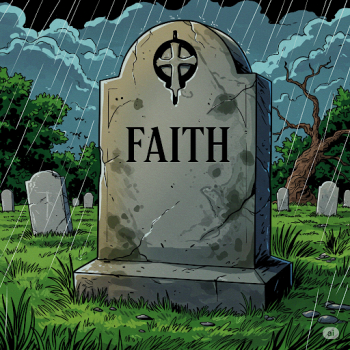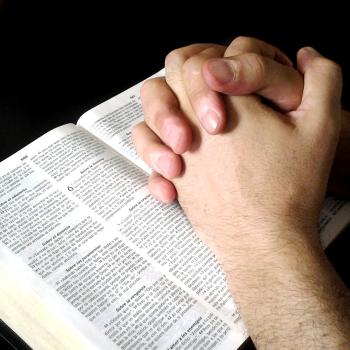Between my ministry and my education, I have had the privilege of meeting and befriending many Christians from many different expressions of the faith.

Image via Pixabay
I am a Pentecostal in my upbringing, and presently am an Anabaptist by adoption, and my family roots come from a long line of devout Anglicans.
But beyond that, I have had my spiritual journey enhanced through my friendships with and mentorship by Baptists, Methodists, Presbyterians, Reformed, Charismatics, Lutherans, and many other streams of the capital “c” Church.
I have heard (but never counted) that there are somewhere in the neighborhood of 8,000 different denominations of the Christian faith in the world today.
Whenever I meet a new person who is a Christian, it seems inevitable that eventually one of us will ask something like, “What denomination are you?”
It’s like asking someone, “What do you do for a living?” The answer hopefully doesn’t matter too much, but it can very quickly give a picture of what a person’s life is like.
But of course, these distinctions also easily become battlegrounds, where Christians make our need to be “right” more important than our call to love one another (Jn 13.34) and our call to unity (Jn 17.11).
Rather than celebrate the massive and crucial things that many Christian groups believe in common (Jesus! Scripture! Calvary! Resurrection! Salvation!), it seems to be much easier to focus the bulk of our attention on the areas of faith where we disagree on how to interpret certain Scriptures, and have come to different convictions on certain matters.
When that happens, we attack, insult, divide, self-elevate, and tear down others for whom Christ died.
I am not negating the importance of the search for truth, or in holding to one’s biblical convictions.
Rather I am grieving that, for some, they have concluded that their convictions in this search give them the right to dishonour a fellow believer.
And I have learned this for certain – there is much for me to learn from other streams of the Church, even if I don’t agree with them on everything.
Throwing the baby out with the bathwater is common, but is a sign of immaturity.
Learning to live in the tension of disagreement, but to do so with love and respect, is a sign that we are maturing.
I love Anabaptism, and I am currently an Anabaptist pastor, and this is an Anabaptist column. Anabaptism is not perfect. But when it comes to labels, it is the closest thing to where I’m at right now.
But I have been wonderfully challenged by how other streams of the Church fight for justice, or how they evangelize, or how they pray. I need to be more like them in so many ways.
When we are face-to-face with Jesus, we will know the entire truth about Him; right now, we only know in part (1Cor 13.9-12).
If I had to guess, I imagine every Christian label will have missed things, every denomination will have gotten some things wrong, and every human attempt at a systematic theology will end up sorely lacking in capturing the fullness of who our glorious God is.
In the meantime, I want to be humble, and to encourage the good I see in other streams, and to learn from them what I see lacking in myself and my own stream.
Every branch of Christ’s Church brings something to the broader Body, every section has strengths that can inspire and instruct the rest of the people of God.
Ultimately, when I get down to it, I just want to be Spirit-filled and Spirit-led like a Pentecostal; devoted to Scripture like someone Reformed; worship passionately like a Charismatic; live before God in awe and reverence like an Anglican; commit to sound doctrine like a Lutheran; share Jesus with others like a Baptist; pursue communion with God like a Methodist; fight for justice like someone United; be grounded in doctrine like a Presbyterian; and to follow the way of Christ like an Anabaptist.
Am I reaching? Is that too much to ask?
There are other important streams of the Church beyond those listed, of course, but the point I think is made.
And of course, all of the things I mentioned are also explored by each of the other streams in various ways – don’t misunderstand that I’m suggesting that Anglicans don’t evangelize or that Baptists aren’t reverent, for example.
The point is that, in humility, we all have much to learn from one another.
And we certainly can fight and divide and elevate ourselves over others, claiming to have the market cornered on truth and looking down on those who disagree with us.
We’ve been doing this in the Church for a long time, and experience and tradition have made us very good at it.
It is one of our worst qualities.
Or we can look at those in other branches of the Church and say, “Will I see this person in Heaven, even if we disagree on some lesser things about the faith?”
And if the answer is “Yes,” then they are a brother or sister, and we are absolutely not to “destroy someone for whom Christ died,” (Rom 14.15), even in disagreement.
Find the stream of the Church where your convictions lie. By all means, plant yourself there.
And then remember that “mercy triumphs over judgment,” (Jam 2.12-13), that we are given strict instructions to graciously engage with each other through disagreements over “disputable matters,” (Rom 14), and that the greatest commandment really was to love God, and one way to love God was by loving others (Mt 22.34-40).
********
If you’ve enjoyed what you read here, you can follow Third Way Christians on Facebook or Instagram, or sign up here to get new columns emailed directly to you! As well, you can track along with Chris’ Sunday morning teaching at Meadow Brook Church’s YouTube page!
















